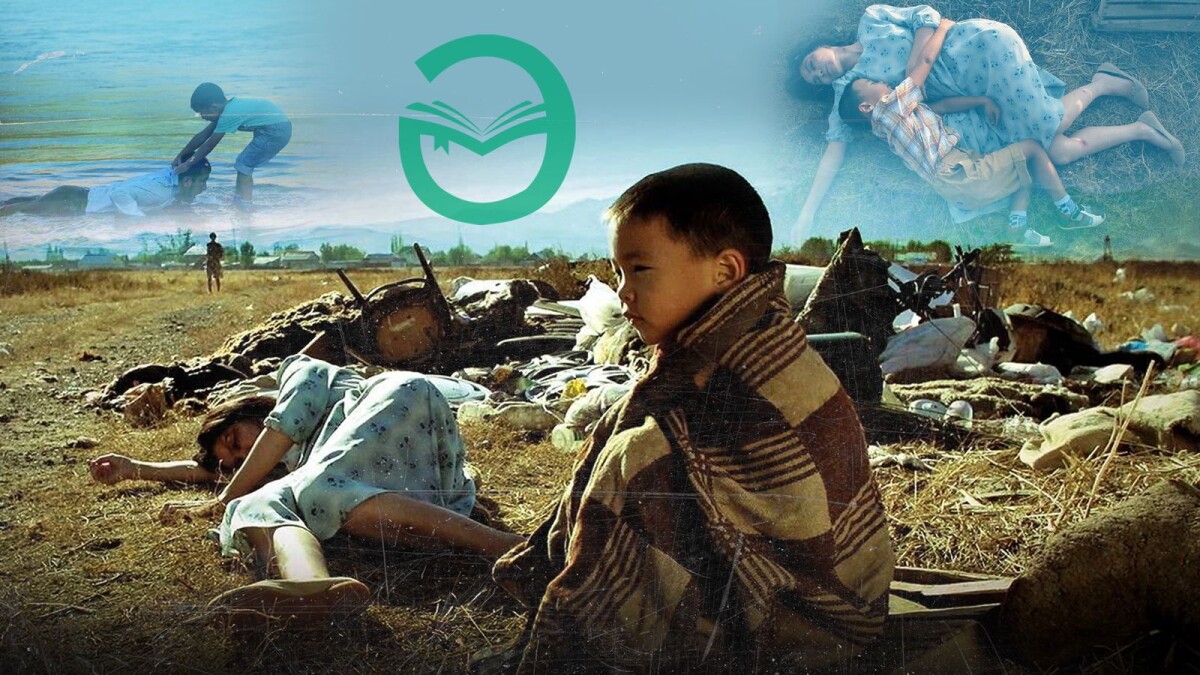Two figures traverse the vast Kazakh steppe, its natural grandeur serving as their backdrop. One is a gloomy young woman named Aiganym, accompanied by a small child of about five or six years old, unwittingly following in her footsteps. They trek along the lengthy road leading to their native village. Aiganym, who left for Almaty seven years ago, now resolves to return to her family. Her determination is driven by a profound desire to apologize for her past "sins" and to rebuild connections with her estranged kin, despite any grievances.
Released in 2018, Zhanna Isabaeva's film presents a stark, unflinchingly realistic portrayal, characteristic of the director's previous works. This social drama confronts one of Kazakhstan's most pressing issues: domestic violence and women's rights. While these themes take center stage, the film also delves into broader societal issues such as corruption, betrayal, unemployment, crime, and the ramifications of early marriages.
Prior to "Rejected," Isabaeva directed and wrote films like "Sveta," which shed light on the challenges faced by the deaf community, "Nagyma," depicting the struggles of girls raised in orphanages, and the comedic musical "My Dear Children," critiquing the pursuit of fame under the guise of "shame" in Kazakh society. Her body of work consistently exposes the genuine societal issues prevalent in Kazakhstan.
The genesis of " Rejected" dates back to 2015, when Isabaeva was moved to address the alarming statistics on domestic violence prevalent in Kazakhstan. According to UN Women's 2019 report, approximately 400 women lose their lives annually due to domestic violence in the country—equating to one woman per day. This figure does not account for those who commit suicide due to unreported abuse or endure lasting physical and psychological scars from domestic violence.
“I want the viewer to be ashamed that such barbarity is ‘thriving’ in our country in the 21st century. Why don't our women have rights? Why are murderers not punished and imprisoned according to the law? I have encountered the ‘patriarchal mentality’ of Kazakhs living in rural areas many times, and each time I witnessed oppressed women and felt profound moral anguish. We live in the same country, only a thousand kilometers apart, yet there is a gap of several centuries between us. I couldn't help but make this film,” says film producer Zhanna Isabaeva.
In an interview, the director revealed that the most challenging aspect was securing financial support for the film. The reason is straightforward: many wealthy individuals couldn't stomach the bitter truths portrayed and accused the author of excessive dramatization. However, statistics validate that tragic events akin to the film's plot occur daily in real life. Considering these facts and circumstances reported in the news, public relations specialist Alisher Elikbaev decided it was imperative to bring this film to the audience and thus became its producer.
Upon its initial release, the film had limited distribution and was screened in venues with a restricted audience. The producer understood from the outset that profitability from this project was unlikely. According to Elikbaev, several factors contributed to this reality. Firstly, the film is entirely in Kazakh with Russian subtitles, and secondly, it deviates from the popular comedy genre, focusing instead on a weighty drama. The third factor lies in its cast, which comprises young actors embarking on their careers rather than established stars of Kazakh cinema. Despite these challenges, "Rejected," featured on the director's YouTube channel, has amassed over two and a half million views in five years—a notable achievement for a Kazakh-language social drama.
Furthermore, there's no need for regret over the absence of seasoned actors in the film. Zhanargul Zhanimanova, Nyshanbek Zhubanaev, Raikhan Kalioldina, and Indira Kulmagambetova, who portrayed the main roles, delivered exceptional performances.
Now let's get back to the plot of the film. As mentioned earlier, Aiganim has committed what some see as a "grave sin" against her family. She was a young girl who moved to a big city immediately after finishing school, where she became pregnant by her boyfriend. Initially, he promised, "I love you, I'll marry you," but his demeanor changed drastically upon learning of her pregnancy—a sadly familiar scenario drawn from real life. Even her own parents turned their backs on Aiganim, leaving her feeling dishonored.For the past seven years, she has been raising her son alone in the city. Now that her child is older, she longs for the support of her family—siblings who won't leave her child alone. However, her mother's reception was anything but welcoming. Meeting Aiganim at the gate with intense hostility, her mother pushed her away both physically and emotionally. Shockingly, in the presence of a young boy, she verbally abused and physically assaulted Aiganim with vulgar language.
Aiganim's father passed away from a heart attack some time ago, leaving her brother Kairat as the main pillar of support for the family.
From the first appearance of Kairat, the viewer immediately understands that he is worried about something, that life is not good for him, thanks to the masterful performance of Nyshanbek Zhubanaev. A man who bought food in a store after receiving his salary stops at the house on the way, caresses the children and offers food to his daughter-in-law, who greets her with a bow. He also gives money to family members over tea. “What a wonderful man” comes to mind. But this is just a false hope. Kairat, who left the family of his dead brother, returns to his home. Seeing his sister and her child waiting in the yard, he immediately flew into a rage and beat the girl mercilessly. Fragments of his friendly image are immediately destroyed. No, he is not a citizen helping an orphan, as we think, but a pseudo-proud man raised by a patriarchal society.
He is a rude man who is ashamed that his sister was deceived, but does not hesitate to attack his own sister on the street and throw her in the trash; mother cursing in the presence of a small child; give bribes; do not repay the debt.
Looking at Kairat, you will inevitably become a witness that the patriarchal system also burdens men. Kairat must take care of his children, his mother, his sister with a small child, whose husband is in prison, and his widowed daughter-in-law with many children. He wants to fulfill his duty perfectly, but he only cares about earning money, and being kind to his wife and taking care of his sister is not in his competence. The men of society, who understand that a woman’s duty is to give birth to children and stay at home, do not notice that they have dug a hole for themselves. All the women in Kairat’s family do not work: the mother is old, the sister has a small child, the daughter-in-law has three children, the wife has four children.
The portrayal of Kairat's younger sister Sholpan and his widowed daughter-in-law paints a poignant picture of young women married early, unable to sustain themselves independently and thus compelled to live under someone else's roof. Sholpan, despite her reluctance to reside with her stern brother, acquiesces to Kairat's harsh dictates, cradling her small child. She is the sole family member who warmly receives her sister and settles her in their teacher's home.
Throughout the film, we are confronted with pervasive misogyny in society, starkly illustrated in Kairat's treatment of his sisters. His animosity towards women is palpable, contrasting with his relatively lenient behavior towards others, such as his younger brother. Despite his own financial constraints, he extends aid to his brother working in the mines. Yet, Kairat openly disapproves of Sholpan remaining at home, explicitly expressing his displeasure.
Aiganym also meets her tragic end at his hands, illustrating his selective compassion. What about the daughter-in-law? One could argue that he reached out to her. Yes, he helped because this woman is a mother who is looking after three male children left behind by his brother. In fact, it goes without saying that he only cares about his brothers and not about the poor woman. This woman also lost a man, Sholpan is also temporarily separated from her husband, but the relationship towards them is completely different.
And it cannot be said that his attitude towards his mother is also worthy of praise. However it's evident that she played a significant role in shaping his behavior herself. Isn't a mother's cruelty in refusing to forgive her own daughter for a single mistake an influential example for her son? And the fact that no matter how cruel Kairat beat the girl, his mother remained passive, never once intervening or uttering a plea to stop. This silence speaks volumes—it suggests she had long turned a blind eye to her son's cruelty. It was only when Kairat's violence led to Aiganym's death that she finally implored him to cease, but by then, it was tragically too late. It raises an intriguing question: why does this mother, who can assert herself on other matters and wield authority over the family finances, hesitate to protect her own daughter? Is it also considered “shameful” in Kazakh society to protect a person who has an illegitimate child from cruelty?
One of the problems discussed in the film is underestimation of labor costs and delayed wages. When Batyr (Kairat’s brother) met his brother, he told him that the company was not paying him his salary. He sais that if there is a delay of one month, they will protest as workers. At this time, the characteristic of overly proud men in society is even stronger than Kairat. He asked his younger brother: “Where is the riot?” What are you talking about? You only get out of prison once, sad. Take even more care of your children,” says the mind. A person who spits on someone else's rights cannot protect his own rights. Kairat is one of those ordinary men who can only fight those who are weaker than him, and look sad in front of those who are a little stronger.
And it cannot be said that his attitude towards his mother is also worthy of praise. However, it is not difficult to see that he also contributed greatly to the formation of Kairat. That is, isn’t the cruelty of a mother who failed to forgive her own daughter a mistake, an example for her child? And the fact that she did not intervene and did not say “stop” when Kairat, who was very angry, beat the girl, shows that until then she turned a blind eye to her son’s cruelty. Only when he kills the girl does she ask Kairat to stop. But it was too late... It is interesting that a mother can raise her voice to her son when it comes to other issues, and can exercise her power over money. But why does she hesitate to protect her daughter? Is protecting a person who has an illegitimate child from cruelty also considered “shameful” in Kazakh society?
One of the issues explored in the film is the undervaluation of labor and delayed wages. When Batyr, Kairat's brother, mentioned to him that his employer hadn't paid his salary, he spoke of the possibility of protesting with fellow workers if the delay persisted. Kairat, embodying the pride typical of certain members of society, responded sharply: "A strike? What are you thinking? Do you want to end up in prison, you unfortunate soul? It's better to think about your children." This attitude exposes Kairat's character — a person who disregards the rights of others while failing to protect his own. He represents the archetype of men who only confront those weaker than themselves and crumble when faced with stronger opposition.
Zhanna Isabaeva and co-writer Viktor Nemchenko demonstrated remarkable skill in crafting a narrative that vividly portrays Kazakh society. The film doesn't shy away from depicting scenes of corruption, inherent in reflecting the harsh realities of life in the country. Every character in the village is interconnected; wherever Kairat turns to cover up a crime, there are always people ready to assist him "as brothers." However, familial ties alone no longer suffice—nowadays, substantial bribes are required to resolve issues.
It is impossible to watch this film without evoking strong emotions. The authentic performances, a compelling storyline, cohesive cinematography (by Nurbolat Zhapakov), and poignant music that enhances the film's message all contribute to the impression of witnessing real life. Alongside Elikbaev, producers such as Saken User and Artur Isabaev have significantly contributed to bringing forth this remarkable work. Special recognition is due to the cinematographer Mikhail Blintsov, whose camera work beautifully captures the essence of each character and showcases the rugged beauty of the natural landscapes where this harsh tale unfolds.
We recommend watching this social drama in its entirety to discover how the story concludes, what consequences Kairat faces for his brutality, and to explore the various subplots and additional layers that we may not have fully explored here. While it may be challenging to confront the realities of the society we live in, acknowledging these issues is the first step towards finding solutions.












